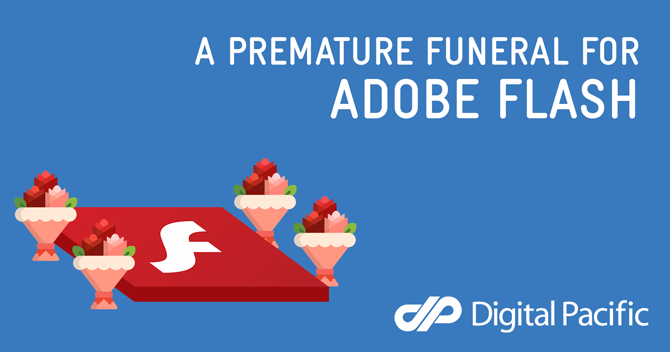The day will come that we have to say goodbye to the things that we once loved. Even though that day is about three years from now for Adobe Flash, we still miss you already, and sort of don’t miss you.
As a kid, I remember playing tons and tons of flash games on the Internet for countless hours, always in awe of the multitude of creative variety that the games had to offer me. It was only today that I even realised that Adobe Flash was used to develop media other than flash games!
So, in my mind, Adobe Flash will be missed, but for others, it’s a sayonara and good riddance to bad rubbish. HTML5 has risen to dominance over the past few years and, consequently, Adobe Flash has been depreciated and discouraged due to criticisms of reliability, security, and performance; even Adobe favours a transition to HTML5 due to Adobe Flash’s inherent security flaws and significant resources to maintain the platform.
For these reasons, I am holding a brief, premature funeral and celebrating the awesome lifetime that Adobe Flash has had.
What is it?
Adobe Flash is a multimedia software platform used for the production of animation, rich Internet applications, mobile applications and games, and embedded web browser video players.
History
1993
- FutureWave Software publishes a product named SmartSketch, a vector drawing application for pen computers running the PenPoint operating system. It ultimately failed in the marketplace and SmartSketch was ported to Microsoft Windows and Mac OS.
1995
- Frame-by-frame animation features were added to SmartSketch and it is released as FutureSplash Animator.
- FutureWave Software approaches Adobe with an offer to sell their software–Adobe says no.
- Microsoft adopts FutureSplash as a central part of the portal of its MSN relaunch.
- Disney Online uses FutureSplash for their subscription-based service “Disney’s Daily Blast”.
- FOX launches The Simpsons using FutureSplash.
1996
- FutureSplash is acquired by Macromedia and is rebranded as Macromedia Flash 1.0. It involves two parts: Macromedia Flash and Macromedia Flash Player.
1997
- Macromedia Flash 2 is released.
1998
- Macromedia Flash 3 is released.
1999
- Macromedia Flash 4 is released.
Full scripting implementation, called Actions (soon to be ActionScript), is developed and released with Flash Player 4.
2000
- Macromedia Flash 5 is released.
- The first version of ActionScript is released with Flash Player 5 and allows full procedural programming and object-oriented programming.
2002
- Macromedia Flash MX is released.
2003
- Macromedia Flash MX 2004 is released.
- ActionScript 2.0 is released with Flash Player 7.
2005
- Macromedia Flash 8 is released.
- Macromedia is acquired by Adobe Systems in 2005; ten years after Adobe turn down the chance to purchase FutureSplash.
2007
- Adobe Flash CS3 Professional is released.
- ActionScript 3.0 is released with Adobe Flex 2.0 (now Apache Flex) and Adobe Flash Player 9. It supports modern programming practices and enabled business applications to be developed with Adobe Flash.
- iOS and the Apple iPhone is released without the adoption of Adobe Flash, due to concerns that it performed poorly on mobile devices, had negative impact on battery life, and was deemed unnecessary for online content. All future Apple mobile and tablet products would restrict the use of Adobe Flash.
2008
- Adobe Flash CS4 Professional is released.
- Runtime engine Adobe Integrated Runtime (later, Adobe AIR) is released.
2011
- Adobe Flash Player 11 is released with 3D rendering for Adobe Flash applications and games, called Stage3D.
2014
- Over 100,000 unique applications are built using Adobe AIR and it has over 1 billion installations globally.
Adobe AIR is voted as the Best Mobile Application Development product at the Consumer Electronics Show (CES).
2015
- Adobe AIR is again voted as the Best Mobile Application Development product at the Consumer Electronics Show (CES).
2017
- Adobe announced that by 2020, it will cease support, distribution, and security updates to Flash Player. Developers have started a petition to turn Adobe Flash into an open-source project, leading to some controversy.
Goodbye (soon) friend, you are (going to be) lost, but not (going to be) forgotten.


